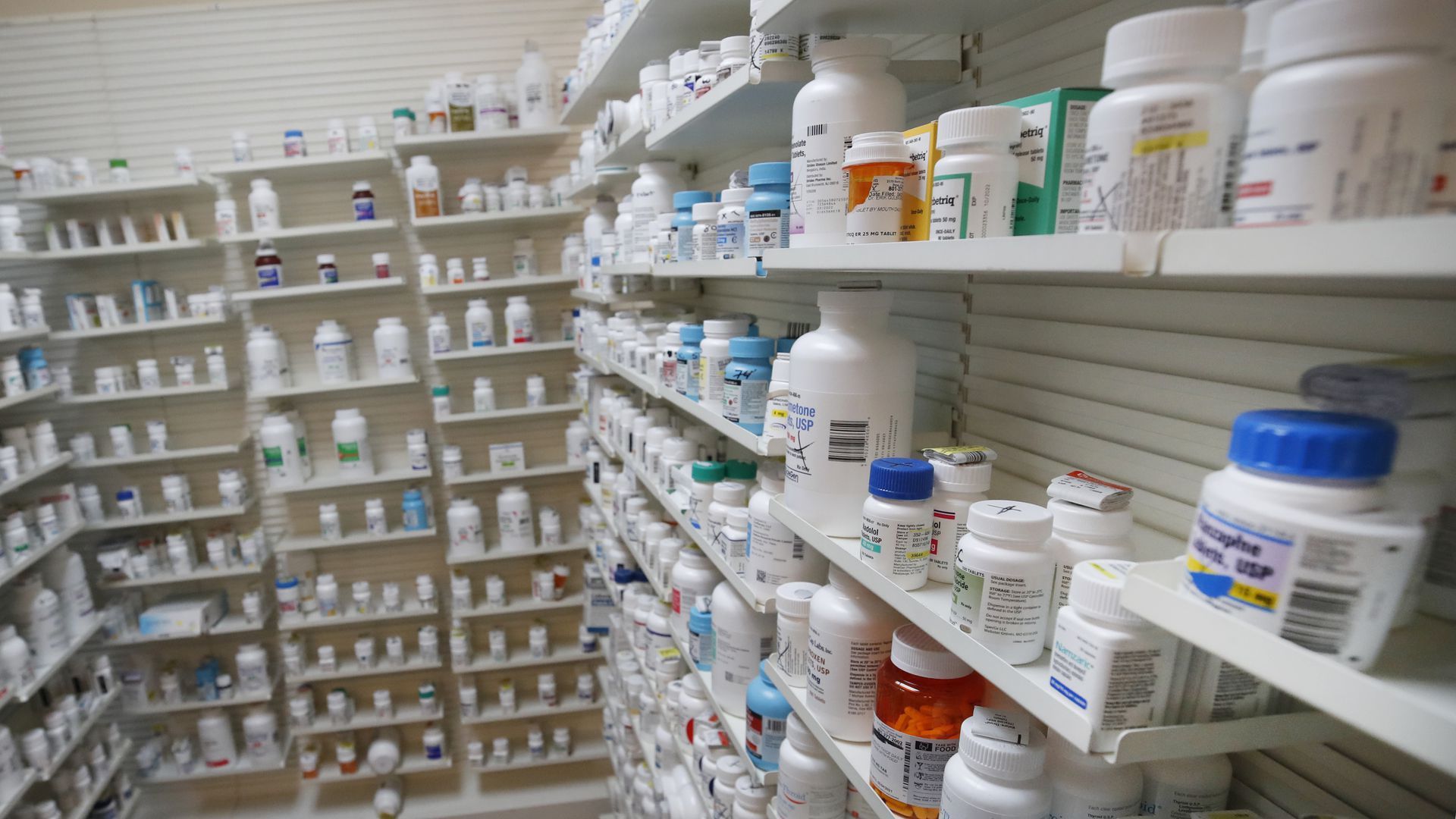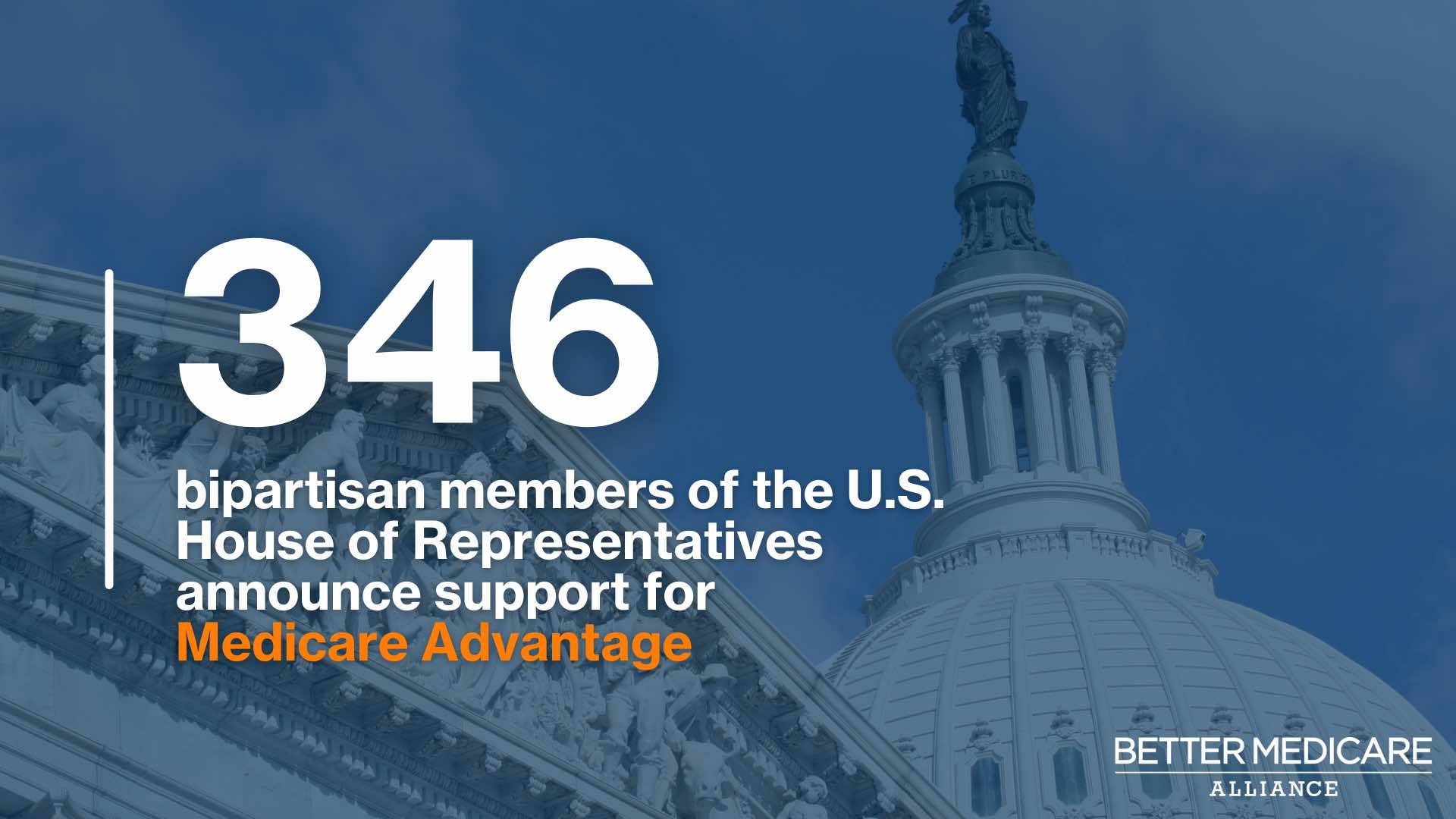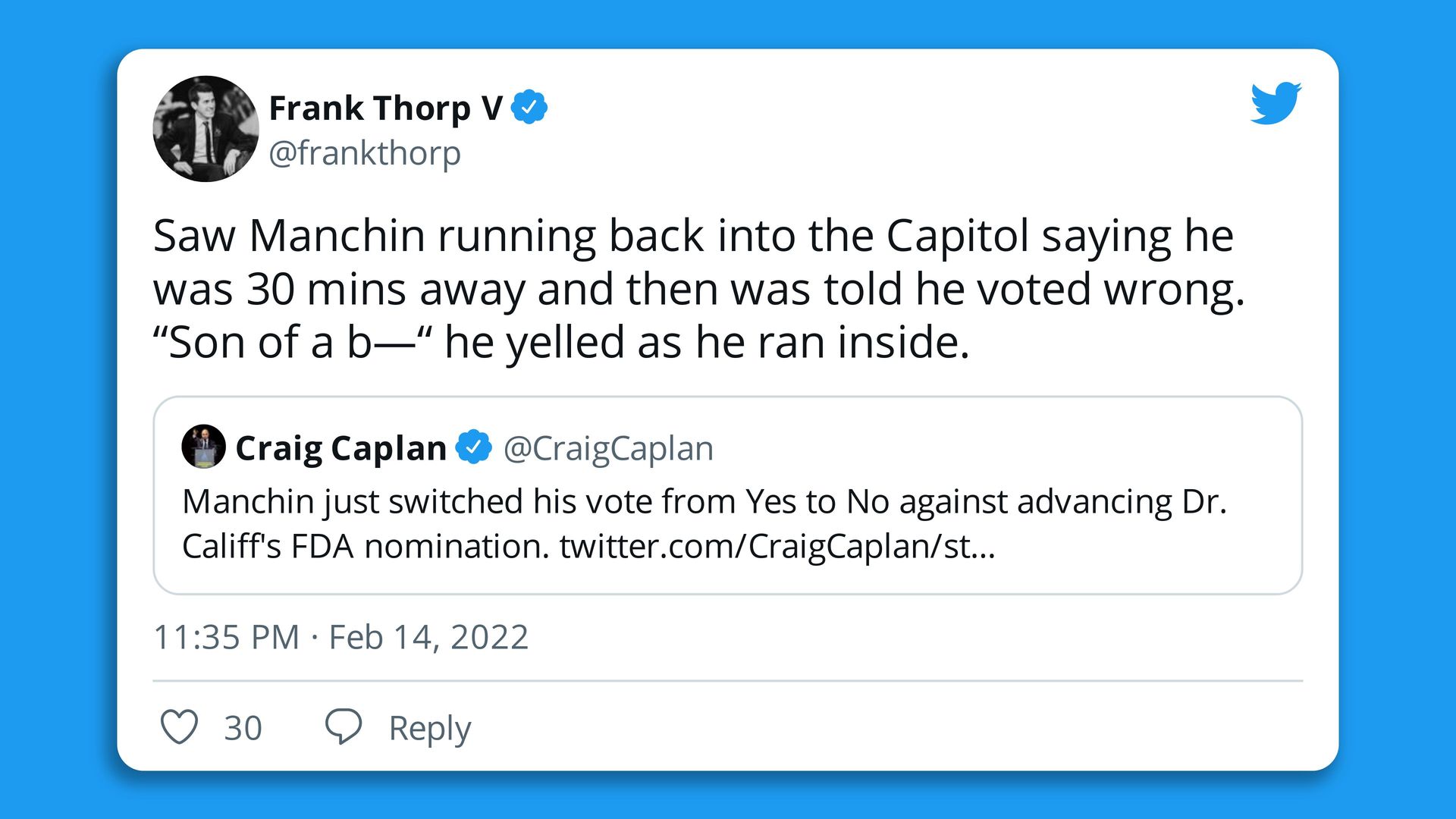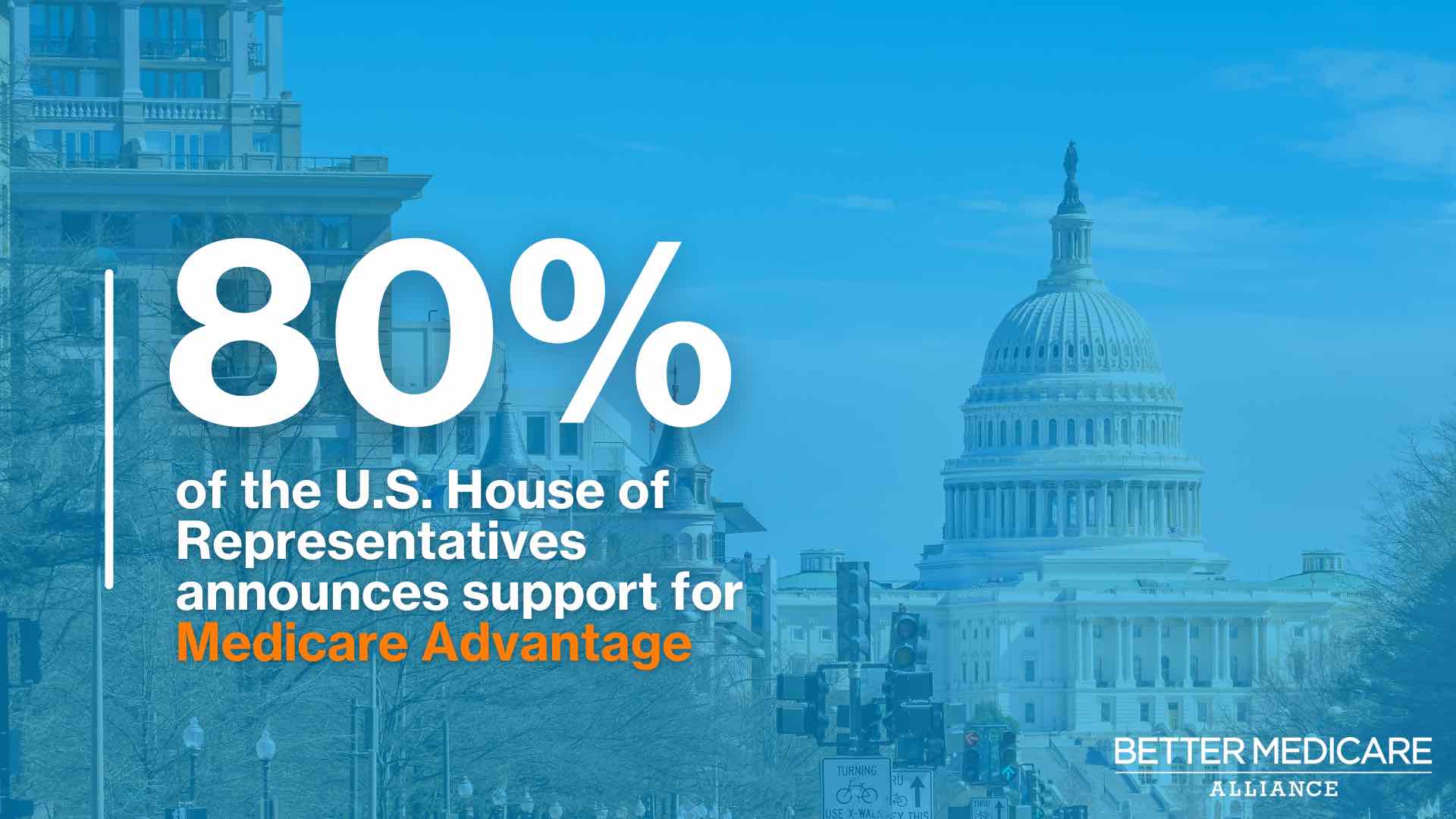| |
| |
| |
| Presented By Better Medicare Alliance |
| |
| Axios Vitals |
| By Tina Reed ·Feb 15, 2022 |
| Good morning, Vitals readers. Today's newsletter is 880 words or a 3-minute read. 👉 Have you signed up yet? Join Axios virtually at our inaugural What's Next Summit on April 5. Register here to attend live stream sessions with discussions on trends that will revolutionize our future. |
| |
| |
| 1 big thing: Health workers eye the exits |
 Data: Morning Consult; Chart: Will Chase/Axios Some of America's health care workers appear to be considering their job options outside the industry, according to a new Axios/Morning Consult survey. The big picture: Health care workers aren't immune from the trends driving the Great Resignation across the U.S. workforce. - Those caring for COVID-19 patients are more likely than other health care workers to report they've been thinking about heading to another industry.
By the numbers: The proportion of health care workers considering leaving their jobs for another industry has increased steadily since last summer. - In July and August, 15% of health care workers considered leaving the health care industry. Just under one in five (19%) of those who cared for COVID-19 patients reported considering it.
- As Omicron began to hit in November and December, the share of health workers considering leaving the industry increased to 20%, and the number of frontline workers considering leaving the industry hit 23%. That has remained largely steady through January.
Yes, but: Only 6% of health care workers reported actually leaving their jobs between July and August, and just 3% say they've left so far this year. The big picture: The majority of frontline healthcare workers said they've been able to cope with the stressors of the pandemic (58%). - A plurality of workers (44%) felt the worst of the pandemic was behind us, and a majority felt their facilities were equipped to respond to an increase in patients (60%).
What they're saying: The timing of the survey, when Omicron was starting to decline, may be a factor in the sense of resilience reflected, Robin Graziano, Morning Consult's managing director of strategic services, told Axios. - However, more than 50% of frontline workers said their mental health had worsened since the start of the pandemic, and about 40% said their physical health had worsened.
|
    |
| |
| |
| 2. Many knowingly disagree with scientists |
 Data: The COVID States Project; Chart: Sara Wise and Baidi Wang/Axios A third of Americans who believe coronavirus vaccine misinformation are aware that they're in disagreement with scientists and medical experts, Axios' Caitlin Owens writes from a new survey by The COVID States Project. Why it matters: This suggests that educating people on the science behind vaccines won't be sufficient to change many minds. By the numbers: The survey found that 16% of Americans believe inaccurate information about the vaccines, and nearly half say they're unsure whether at least one vaccine misinformation statement is true. - Around 5% of survey respondents said they believe the COVID vaccines contain microchips, 7% said they use aborted fetal cells, 8% think that they can alter human DNA, and 10% said the vaccines can cause infertility.
- 46% said they were unsure whether at least one of these claims was true. All have been debunked.
Between the lines: Distrust of scientists isn't only held among those who say they believe one of these four myths. - One in five Americans says that even though they know scientists believe a particular vaccine claim is false, they're unsure about whether to believe it.
Read the rest. |
    |
| |
| |
| 3. Evidence against drug copay cards grows |
 |
|
| If there is a brand-name drug on this shelf, odds are its maker offers a coupon. Photo: George Frey/AFP via Getty Images |
| |
| Drug copay coupons make medications free or very cheap for patients at the pharmacy counter. - But they drastically increase the amounts paid by employers, insurers and other workers, according to a new study conducted by a trio of health economists, Axios' Bob Herman writes.
Why it matters: The study adds further evidence to the idea that drug copay cards are a great short-term deal for patients — and especially the pharmaceutical companies that promote them — but a bad long-term deal for society. Details: Drug copay cards are banned from federal health care programs, and there could be sizable savings if they were not allowed in private health plans. - The researchers estimated the health care system could save $1 billion annually if copay cards were banned — and that's just for multiple sclerosis drugs.
What to watch: "Our results suggest that popular policy proposals such as capping cost-sharing, or requiring plans to shift from coinsurance to fixed (and low) copays are likely to lead to" higher drug prices, the economists wrote. - "These reforms would likely exacerbate the underlying problem of high prices while addressing a symptom (high patient cost-sharing)."
|
    |
| |
| |
| A message from Better Medicare Alliance |
| Congress sets a new, bipartisan record on Medicare Advantage |
| |
 |
| |
| A record-setting 346 bipartisan members of the U.S. House — 80% of the chamber — sent a letter to the Biden administration supporting Medicare Advantage coverage. Why it's important: A new poll shows that 9 out of 10 seniors are satisfied with Medicare Advantage. Get the details. |
| |
| |
| 4. A startup for starting a family |
 |
|
| Illustration: Shoshana Gordon/Axios |
| |
| Gaia, a London-based startup, is debuting a personalized in-vitro fertilization insurance product, Axios' Erin Brodwin reports. Why it matters: Families undergoing fertility treatments pay what can add up to tens of thousands of dollars in their pursuit of a baby. Driving the news: Several fertility companies in the U.S. offer risk-sharing models, including Spring Fertility and Shady Grove Fertility. - But it's rare to see IVF insurance offered as a stand-alone product, entrepreneurs and industry observers tell Axios.
One bittersweet thing: CEO and founder Nader AlSalim created Gaia after he and his wife went through five rounds of IVF across three different clinics in two countries. - The process cost a total of roughly $68,000.
- And "we're one of the few to have something to show for it — a child," AlSalim tells Axios.
For more details, sign up for a free trial to Axios Pro's Health Tech Deals. |
    |
| |
| |
| 5. Tweet du jour |
 |
|
| Screenshot: @frankthorp (Twitter) |
| |
| In a procedural vote Monday, the Senate advanced Robert Califf's nomination to become the next FDA chief by a margin of 49-45. - The vote, which came out 49-45, had some additional drama after Sen. Joe Manchin, D-W.Va., had to change his vote, according to reporters tweeting from the Hill on Monday evening.
- A final vote is expected today.
|
    |
| |
| |
| A message from Better Medicare Alliance |
| Take note: How health care can be bipartisan |
| |
 |
| |
| Bipartisan consensus can sometimes seem elusive in Washington, but 346 House Democrats and Republicans proved it's still possible. Here's how: The bipartisan members came together to declare support for Medicare Advantage in a new letter to the Biden administration. Read more. |
| |
| 📫 Did someone forward this email to you? Here's how to subscribe. Editor's note: The second story in yesterday's Vitals was corrected to show that the "Face the Nation" moderator was Margaret Brennan, not Norah O'Donnell. |
 | Bring the strength of Smart Brevity® to your team — more effective communications, powered by Axios HQ. | | |










No comments:
Post a Comment